Escalating Suppression Of Baha’is In Iran Causes Concern
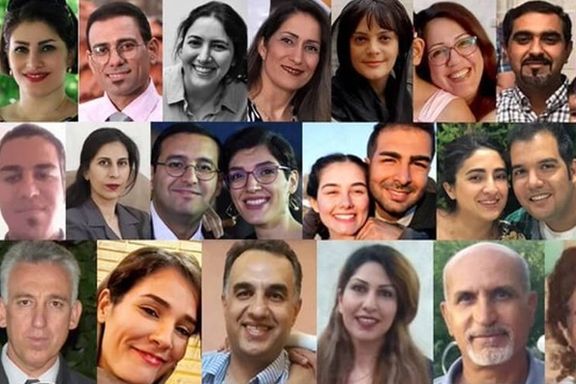
Baha'is around the world are protesting against a recent surge of repression against the Baha'i community in Iran

Baha'is around the world are protesting against a recent surge of repression against the Baha'i community in Iran
Nearly 60 members of the minority faith group have been arrested or imprisoned in recent weeks, and 180 further members have been subjected to a relentless campaign of torture.
On Tuesday, the global Baha'i community confirmed that the detained individuals include a 90-year-old man, Jamaloddin Khanjani, who has a history of imprisonment in Iran due to his religious beliefs. He was apprehended along with his daughter, Maria.
Khanjani's previous decade-long imprisonment, from 2008 to 2017, was a result of his affiliation with Yaran, an administrative group established in response to the prohibition of official Baha'i institutions in Iran. The Yaran group, which was dissolved in 2008, sought to cater to the spiritual needs of the community. Each of it seven members were initially handed 20-year sentences, which were later reduced to 10 years and were released in 2018.
Highlighting the escalating repression, Baha'is around the world highlighted the cases of Mahvash Sabet and Fariba Kamalabadi, former members of Yaran. Both women, who were arrested on July 31, 2022, recently received confirmation of their 10-year prison sentences from an appeals court. Sabet, 70, who suffers from severe physical ailments, was among those sentenced. Afif Naimi, another Yaran member who also faced significant health issues, was sentenced to seven years imprisonment.
Meanwhile, the government's crackdown extended to the arrest of nine additional Baha'is on August 13. Accused of disrupting the drug supply, these individuals, including pharmacy owners and employees, had their businesses sealed and closed.
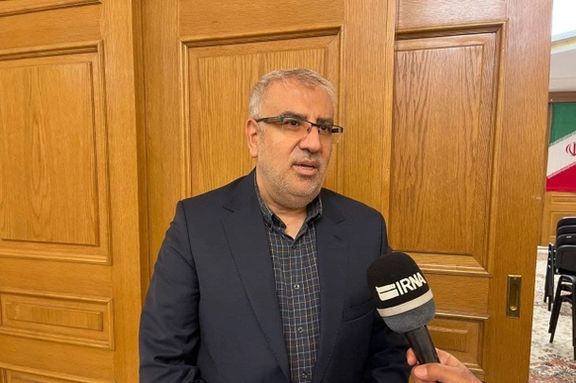
Javad Owji, Iran's Minister of Petroleum, has officially confirmed the suspension of gasoline sales to Iran by Russia.
During a cabinet meeting held on Wednesday, Javad Owji said that Iran’s entire supply of gasoline will now be produced and supplied domestically.
These comments confirm Iran International’s report on Tuesday of the cessation of petrol sales to Iran by Russia.
The ministry's initial plan was to import up to 10 million liters of gasoline from Russia on a daily basis to bridge the gap between production and consumption. In February and March, Russia supplied up to 30,000 tons of gasoline and diesel to Iran, Reuters reported.
Minister Owji not only confirmed the suspension of gasoline imports from Russia, but also acknowledged the existing petrol shortage crisis and the extended queues at fuel stations. Despite the shortages, the minister claimed that there is “no problem in gasoline supply" and stated that, "the parliament has ratified in the budget law that individuals are required to utilize their personal cards for refueling."
The result of Russia’s cessation of supply has led to reductions in gasoline shipments to gas stations and long lines forming with cars rushing to fill their tanks. It has also led to the emergence of a black market for gasoline at significantly inflated prices
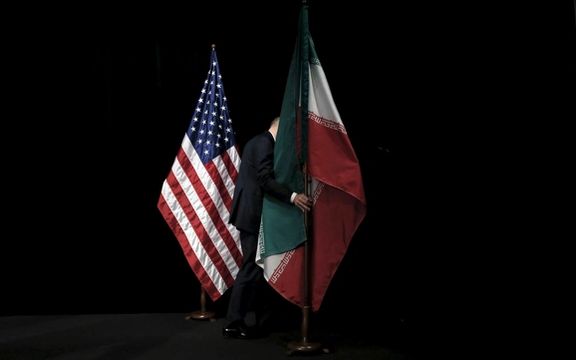
The former US Secretary of State, Mike Pompeo, has warned that the latest prisoner release deal with Iran, providing billions in ransom, sets a “dangerous precedent”.
Five US citizens unlawfully held in Iran have been released on the back of a deal which has freed up at least $6bn of funds from South Korea, but experts say the price is too high. “This will only encourage more hostage taking by the Iranian terrorists” Pompeo said.
During an interview with radio host John Catsimatidis, he spoke about the deal which will see billions of dollars sent to Qatar, which the US continues to assert will be used for the likes of humanitarian aid, in accordance with sanctions rules. "It's really dangerous," Pompeo said on "The Cats Roundtable" on 77 WABC.
"It's dangerous for the Gulf nations, it's dangerous for … Israel.” Pompeo said paying for the Americans' release will only help "build their [Iran's] economy" and encourage more hostage-taking … You now have a situation where we have told the Iranians, For every American you take, the Biden administration will provide you with $1bn," Pompeo told Catsimatidis.
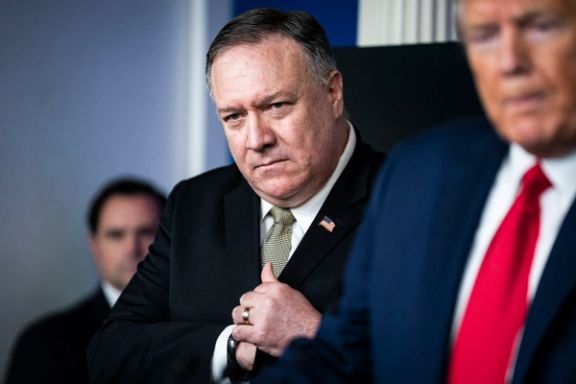
Richard Goldberg, a senior adviser at the Foundation for Defense of Democracies and former White House National Security Council director for countering Iranian weapons of mass destruction, echoed the fears.
“President Joe Biden’s decision to trade $6 billion for five American citizens unlawfully detained in Tehran isn’t just the largest hostage ransom payment in American history—it’s also the second phase of an unacknowledged agreement with Tehran that strengthens the ayatollah’s position in the Middle East and frees the regime to cross the nuclear weapons threshold at a time of its choosing. Americans need to brace themselves for the consequences of both realities,” he wrote this week.
He said that what would normally be a celebratory welcome home for the Americans is now overshadowed by the methods used to win their release and the implications of a foreign policy he says is “bent on appeasing the world’s leading state sponsor of terrorism”.
He raised the issue that the White House announced the latest deal during the August congressional recess, accusing Biden of skirting the legislation to protect any changes being made to the Iran Nuclear Agreement Review Act.
“Emergency hearings cannot be held. Resolutions of disapproval cannot be fast-tracked. President Biden has successfully evaded the Iran Nuclear Agreement Review Act, which requires him to notify Congress of any agreement with Iran related to its nuclear program before lifting sanctions.”
It is not the first time Iran has won in the hostage diplomacy stakes. In 2015, President Barack Obama agreed to pay Tehran $1.7bn for the release of four Americans as part of the broader negotiations over the first Iran nuclear deal.
Iran took more hostages in the months and years thereafter, believing it could get an even better price from a future US president. While the Trump administration turned to pressure instead of ransoms and won the release of two hostages without paying a dollar, under Biden, ransom payments have returned at multiple times the cost. While the Obama administration paid $425 million per American in 2015, the Biden administration has agreed to pay $1.2 billion. “History teaches us that Iran will only be emboldened by this swap, taking additional Americans hostage in the months and years to come,” Goldberg warned.
The Biden administration has lost the trust of many, both at home and abroad. Jason Brodsky, Policy Director at United Against A Nuclear Iran, said: “The amount of gaslighting coming out of the US government on #Iran policy is extraordinary: officials claim sanctions are being enforced when they're not; officials deny "nuclear agreements" when there appear to be "nuclear understandings;" officials initially hid Malley's clearance being suspended; the list goes on.”

This week, the Financial Times claims the latest deal is also aiming to pressure Iran to stop selling drones to Russia in its war on Ukraine, in addition to spare parts for unmanned aircraft. In what the newspaper claims is part of a broader “unwritten understanding” between Washington and Tehran to de-escalate tensions and contain a long-simmering nuclear crisis, it claims the Biden administration has raised the issue with the regime at indirect talks in Qatar and Oman this year.
However, the likelihood of this looks low, Iran and Russia deeply entrenched in military capacity building. In June, Iran International reported that the two sanctioned nations are busy building a drone manufacturing plant in Russia for use in Ukraine. The factory could build as many as 6,000 drones according to intelligence reports.
At the time, White House National Security Council spokesperson, John Kirby, said: “This is a full-scale defense partnership that is harmful to Ukraine, to Iran’s neighbors, and to the international community. We are continuing to use all the tools at our disposal to expose and disrupt these activities including by sharing this with the public — and we are prepared to do more.” The question is, at what price.
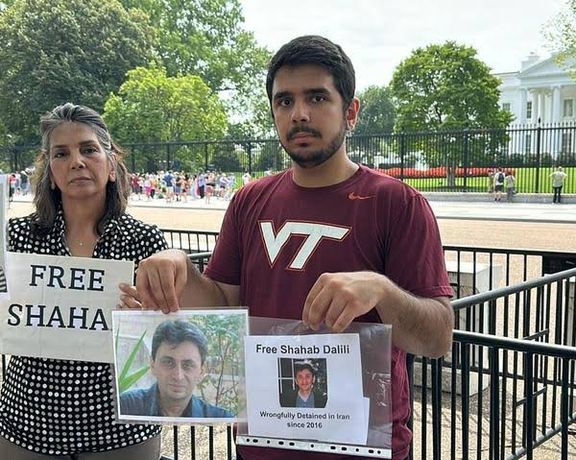
The family of a detained US permanent resident left out of a hostage release deal between Iran and the United States demand fair treatment.
On the fifth day of a sit-in protest that has moved from outside the White House to the US State Department's premises, the family of Shahab Dalili, is calling for his release as part of the Tehran-Washington agreement.
On Monday, Deputy Spokesperson Vedant Patel of the US State Department addressed the situation during a press conference, casting doubt on whether Dalili's case falls under the category of "wrongfully detained.”
Dalili, a former captain of Iran Shipping Company and a US resident, was arrested during a trip to Tehran in 2016 for his father's funeral, after which he was apprehended by Iranian security forces.
Patel said, “and what I would say in the case of Mr. Dalili is that that case has not yet been determined wrongfully detained. We obviously don’t discuss the specific details of individual cases who have not been deemed wrongfully detained.”
This contradicts previous remarks by US Secretary of State Anthony Blinken, who said on August 19ththat there were no other American citizens imprisoned in Iran apart from the five known detainees.
Shahab Dalili's son, Darin Dalili, expressed disappointment and disagreement with the Deputy Spokesperson's statement, deeming it "incorrect." In response to the family's concerns, Patel clarified that the US was actively investigating Dalili's case and had engaged in discussions with the family regarding his situation.
Undeterred by the conflicting messages, the family continue their sit-in outside the US State Department.
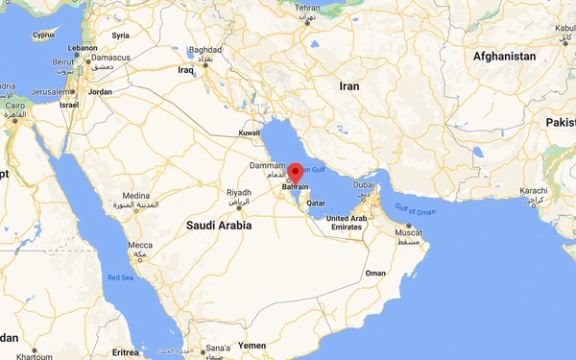
The Iranian regime has launched a propaganda campaign to blame the late Shah for losing Bahrain as part of Iran, but it was actually lost a century before.
Tehran's municipality controlled by Regime hardliners has installed numerous billboards across the capital accusing the Pahlavi dynasty -- the last monarchs of Iran -- of “selling out the homeland,” a claim that is historically wrong but indicative that the regime feels threatened by popular nostalgia about the Pahlavi era.
The regime’s propaganda line is also echoed by several officials, such as government spokesman Ali Bahadori Jahromi, who shared a collage of news pieces dating back to mid-August 1971 when Bahrain declared independence. However, the independence was not from Iran; but from the United Kingdom.
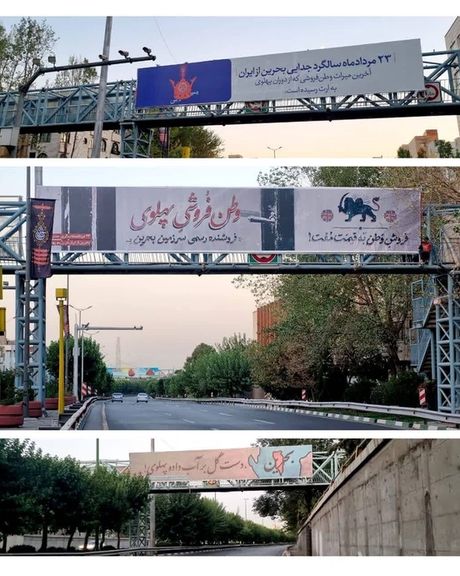
Bahrain was a dependency of the Persian Empire when in 1783 the Bani Utbah tribe led by Al Khalifa invaded the territory from their base in current-day Qatar. Ahmed ibn Muhammad ibn Khalifa -- the progenitor of the dynasty, known as Ahmed the Conqueror, expelled the Iran-installed governor. His successors kept Bahrain under their control over the next decades, and Tehran’s loose grip was completely lost in 1861, when Britain acknowledged Al Khalifa family as its rulers.
Since the treaty with Britain, until independence in 1971, Bahrain was virtually a British protectorate, where the British king was the supreme authority and members of the Sunni Muslim ruling family held the main political and military posts. Although August 15 is the date when Bahrain gained its independence from Britain, the kingdom celebrates December 16 as its National Day, the date of Emir Isa bin Salman Al Khalifa’s ascension to the throne in 1961.
The Pahlavi dynasty, founded by Reza Shah Pahlavi, replaced the Qajar dynasty in 1925. Since then, both Reza Shah and after that his son Mohammad-Reza Shah tried to reclaim Bahrain and negotiated with the British on several occasions but to no avail. Different Iranian governments and the Pahlavi kings themselves repeated the claim over Bahrain and even passed a bill in 1957 to officially announce Bahrain as one of the provinces of Iran, but in practice the legal status of the Arab-majority archipelago remained the same.
Mohammad-Reza Shah, who was also engaged in a similar battle for three Iranian islands of Abu Musa and the Greater and Lesser Tunbs, finally announced during a trip to India in 1969 that if the people of Bahrain were not willing to become part of Iran again, Tehran would withdraw its territorial claims. The Shah emphasized that Iran is not seeking to use force for the annexation of Bahrain. “I want to say that if the people of Bahrain do not wish to join our country we shall never resort to force, because it is against the policy of our government to use force ... Our policy and philosophy is to oppose occupation of other territories by force."
Following a United Nations survey – a controversial poll sometimes referred to as a "referendum" -- on whether islanders preferred independence or Iranian control, the United Nations Security Council unanimously passed Resolution 278 on May 11, 1970, and subsequently Bahrain became independent from the United Kingdom. Despite opposition by several Iranian lawmakers at the time, the government accepted the decision and Iran was the first country to congratulate Bahrain for its independence in August 1971.
About three months later, the Imperial Iranian Navy seized the three Persian Gulf islands shortly after the withdrawal of British forces from the Persian Gulf while the Emirate of Ras al-Khaimah claimed the Greater and Lesser Tunbs and the Emirate of Sharjah claimed Abu Musa. Both emirates then acceded to the newly formed United Arab Emirates, but they still reiterate claims over the islands every now and then.
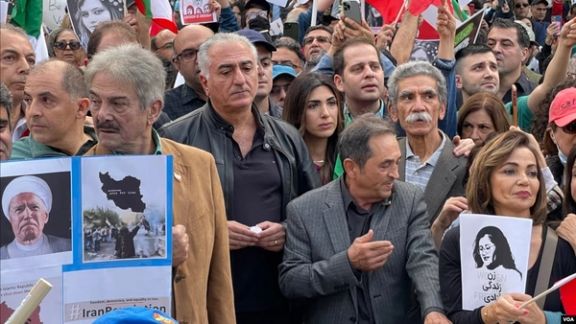
Today, the Islamic Republic regime does not talk about the historical events that led to the independence of Bahrain and only uses it as a ploy to tarnish the Pahlavis, whose popularity has been rising again among the Iranians. During anti-regime protests – especially the current wave sparked by the death of Mahsa Amini in police custody – people chant in support of late kings Reza and Mohammad-Reza, while the exiled prince Reza Pahlavi has become a leading opposition figure touring the globe to make the voice of Iranians heard.
The smear campaign against the Pahlavis is in line with the regime’s new tactics of soft war, labeled by Iran’s ruler Ali Khamenei as ‘vindication jihad’ (jihad tabyyin). In recent years, Khamenei has applied the phrase to efforts both in the media and on social media platforms to provide new interpretations – as well as fake history in case of Bahrain – to portray the regime better than what it really is.
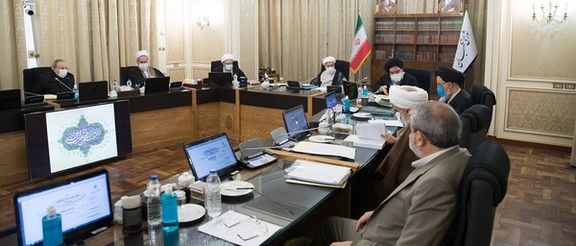
While the approaching parliamentary elections in March fail to generate enthusiasm among Iranians, the media diligently covers what analysts and regime figures say.
This is part of the regime's strategy to stoke anticipation, giving the impression that noteworthy developments might unfold. However, the electorate's disillusionment stems from the heavily manipulated elections of 2020 and 2021, which ushered in one of the most ineffectual parliaments and governments in recent national history.
Analysts in Tehran attribute the public's indifference to the government's insistence on limiting election choices to ultraconservative candidates, combined with the political system's inability to address a multitude of crises. This ambivalence is akin to perceiving the elections as transpiring in a different realm. The people's sentiment is perhaps best captured by the Persian proverb, which roughly translates to "If the pot is not boiling for me, let them cook whatever filthy beast they want to cook."
In their daily efforts to "heat up the stove," the media seized the opportunity on Sunday to bring familiar names to the forefront. Speculation emerged that Ali Motahari, a controversial conservative former legislator known for cautiously criticizing Supreme Leader Ali Khamenei, might contend for a parliamentary seat. Etemad Online wrote that Motahari is one of the nearly 30,000 people who have taken part in early candidate registration.
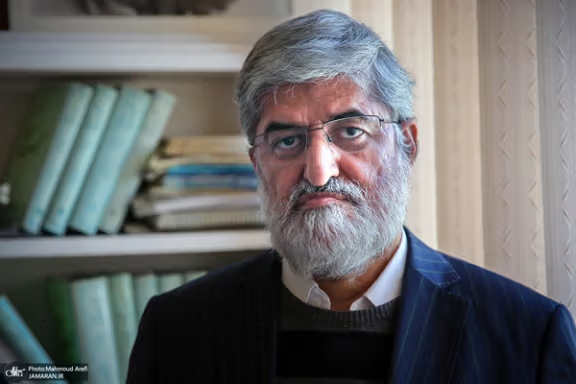
Another round of conjecture circled on Sunday, this time involving former Majles Speaker Ali Larijani as a potential candidate. After weeks of oscillating reports regarding his intentions, a political figure close to Larijani, Behrouz Nemati, revealed that Larijani himself wouldn't run, but he intends to endorse a slate of like-minded candidates.
Larijani's reluctance to participate in the elections, following his highly questionable disqualification in the 2021 presidential race, was evident. However, if he were to run for a position, it would likely be for Iran's presidency, given his prior leadership of the Parliament. The role of Speaker, once easily attainable due to Khamenei's support, now poses a greater challenge for him.
Notwithstanding, Nemati called on the public to turn out in significant numbers to contribute to a high-turnout election, thereby bolstering the regime's legitimacy, which has been eroded, particularly after the 2022 nationwide protests.
On the same day, former reformist President Mohammad Khatami was quoted as having said that the country's leaders call on the reformists to participate in the upcoming elections but they take every step to make sure that reformists are not allowed to run. Khatami, who was meeting with leading reformists, referred to media attacks from hardliners targeting his recent calls for reforms to save the regime.
Discussing the verbal assaults from the hardline daily Kayhan and other ultraconservative figures, Khatami observed, "The government now interprets suggestions for reform as some kind of deviation."
Meanwhile, Mohammad-Reza Aref, a former vice-president under Khatami's leadership, is expected to run, despite his past perceived inactivity in the parliament. Shunned by other reformists for his aloof behavior when he was the leader of the reform caucus in the parliament, now Aref can hardly be categorized as a reformist.
Although certain media outlets prematurely assess the composition of the forthcoming parliament, most politicians recognize that unless Supreme Leader Ali Khamenei alters his stance within the next five months, there will likely be limited room for moderate or reformist candidates.
The government may attempt to portray certain figures in the next parliament as less hardline or even persuade select individuals within the ultraconservative camp to make occasional controversial statements, simulating diversity and drawing attention.
The depth of disillusionment regarding a free and equitable election is so pronounced that even figures like Mohammad Javad Bahonar, formerly regarded as a hardline conservative, lament that the regime no longer views them as insiders. As the regime fans the flames of anticipation, few authentic politicians would willingly become fuel for the fire.